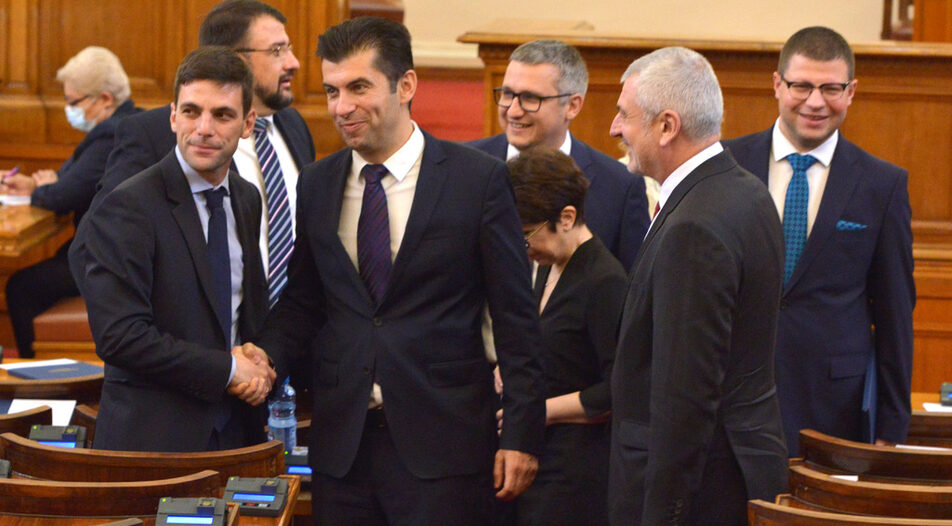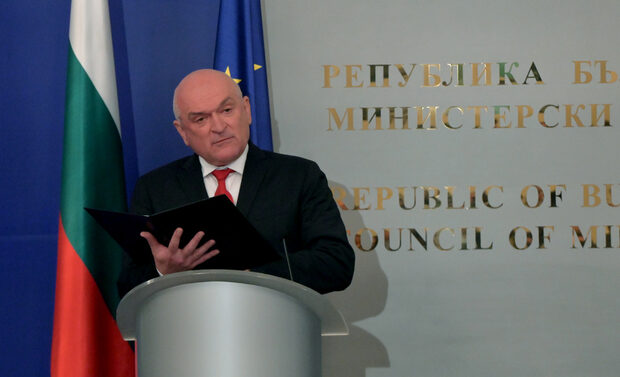Yesterday, 15 June, was "Vidovden", according to the Bulgarian Orthodox church. Often referred to as the "day of reckoning" in local culture, the celebration coincided perfectly with the latest political developments. After showman Slavi Trifonov's announcement last Wednesday that he is withdrawing his TISP party ministers from the government of Kiril Petkov's WCC, throwing Bulgarian politics into crisis, a week later it appears that the day of reckoning for Petkov's cabinet is here.
Despite partial success in drawing support from renegade TISP MPs to keep the coalition afloat, Prime Minister Petkov now faces a vote of no-confidence, requested by the largest opposition party - GERB - and so far formally backed by the loyalist TISP MPs, MRF and Vazrazhdane. The cabinet will almost certainly not survive the vote, which will take place on Wednesday or Thursday next week, as the new four-party anti-government coalition consists of 126 MPs (whereas only 121 votes are needed for a successful vote of no-confidence). How did it come to this?
Trifonov's decision causes TISP rift
Last week's decision by TISP leader Slavi Trifonov to withdraw from the ruling four-party coalition was accepted by all four of his cabinet ministers. Grozdan Karadjov (regional development), Teodora Genchovska (foreign affairs), Alexander Nikolov (energy), and Radostin Vassilev (sports) all filed their resignations. Yet, it appeared that not all of them were aware of - or accepted whole-heartedly - the arguments of their titular leader, who rarely appears in public or, as it transpired later - even among his own party members.
And while Mr Karadjov joined Mr Trifonov in attacking the spending policies of Finance Minister Assen Vassilev (one of the two main reasons that Mr Trifonov cited for leaving the coalition, alongside Prime Minister Petkov's N. Macedonia policy), the other three ministers only said they are leaving their posts because they are toeing their party's line.
Just a few days later, however, it turned out that tensions began brewing within the TISP parliamentary group. Some in WCC already hoped that the party would receive the support of some of Mr Trifonov's MPs (Mr Petkov asked for "12 brave men" from TISP's 25-strong group to step up, so that his coalition could retain its ruling majority in Parliament). Reacting to this, TISP parliamentary leader Toshko Yordanov commented that he didn't expect there would be "that many traitors". He turned out to be half-right.
On Monday afternoon five TISP MPs - Georgi Georgiev, Ivo Atanasov, Svetlin Stoyanov, Nikolay Radulov and Deyan Petkov, led by outgoing Sports Minister Radostin Vassilev, announced that they would be leaving the party's parliamentary group. All six blamed the TISP leadership (meaning Toshko Yordanov and Slavi Trifonov) for holding the party in a feudal grip and serving the interests of oligarchs.
Unsurprisingly, the defections were welcomed by Prime Minister Petkov and his party, but were lambasted by the two TISP leaders who quickly organized a counter-press conference on Monday evening in which they accused Vassilev of treachery and of pressuring party MPs remaining loyal to Mr Trifonov.
In any case, WCC's hopes of getting enough defections from TISP to keep the coalition afloat quickly fell apart.
Stage 2: A new anti-government coalition quickly assembles
It didn't take long for the new anti-government coalition to ferment. On Tuesday evening, GERB announced that it would file a vote of no-confidence against what's left of the ruling coalition, arguing that its fiscal and economic policy had failed. "The destruction of the 25-year consensus to pursue a prudent and disciplined fiscal policy has turned the current government into a threat to the country's financial stability and national security," the draft motion of no-confidence read. "This chapter of Bulgaria's history will be shameful; the only thing we can do is to make it short," party deputy chairman Tomislav Donchev said at an emergency press conference at the former ruling party's headquarters on Tuesday.
It didn't take long for GERB to find allies. Stanislav Balabanov from the loyalist wing of TISP said on Wednesday morning that his parliamentary group would do everything possible to get the defectors from his party and WCC to leave the National Assembly. "The sooner these incompetent specialists, who have been trying their best to plunge the country into chaos with their illogical actions, leave, the better it will be for Bulgarian society," Mr Balabanov told the National Television. According to the deputy chairman of the MRF parliamentary group Yordan Tsonev, the motion against the WCC government could be based on broader grounds, as "they have failed on all fronts".
Last, but not least, the anti-government choir was joined by radicals from Vazrazhdane. "We have repeatedly said that the government consists of national traitors. It would never be too early for them to leave office. There is no doubt about our support for the vote of no confidence. The government's policies are harmful and after leaving power they should be taken to court for them," Vazrazhdane MP Tsoncho Ganev told Nova News on Wednesday.
The Macedonian front opens up
The new anti-government coalition did not wait for the vote of no confidence - scheduled for the middle of next week - and quickly moved into action. At the behest of Slavi Trifonov's formation the four parties voted for the hearing of the outgoing Foreign Minister Teodora Genchovska, nominated by TISP, on the allegations that Prime Minister Petkov carried out a "parallel" policy on N. Macedonia, trying to circumvent the decision of all major parties to keep the veto over the launch of Skopje's EU accession process.
After a rowdy debate, Ms Genchovska announced that Mr Petkov had made a commitment to the Commissioner for Neighborhood and Enlargement Oliver Varhei to lift the veto on N. Macedonia by the end of June - but failed to prove it, as the memos she referred to were deemed classified information.
The Prime Minister's cabinet quickly responded to the allegations by issuing a position, promising that any attempt by the EU to intervene in the Bulgarian framework position on the European integration of the Republic of North Macedonia would be referred to Parliament. It was also promised that the National Assembly would decide on all issues on the subject, including whether to lift the veto for the start of Skopje's negotiations with the EU. Practically, this blocks any chances of finding an alternative solution that would work for everyone involved - Bulgaria, N. Macedonia and Albania, the EU and the Council of the EU presided by France - by the end of the French presidency on 24 June.
The first test of the new four-party coalition, however, would be on a completely different topic - the impeachment of Parliament President Nikola Minchev. It will take place today and, if it passes (currently there are 120 MPs who've backed his sacking with their signatures), it will be the first step towards the end of the Petkov cabinet, barely six months after it came to power.
Yesterday, 15 June, was "Vidovden", according to the Bulgarian Orthodox church. Often referred to as the "day of reckoning" in local culture, the celebration coincided perfectly with the latest political developments. After showman Slavi Trifonov's announcement last Wednesday that he is withdrawing his TISP party ministers from the government of Kiril Petkov's WCC, throwing Bulgarian politics into crisis, a week later it appears that the day of reckoning for Petkov's cabinet is here.
Despite partial success in drawing support from renegade TISP MPs to keep the coalition afloat, Prime Minister Petkov now faces a vote of no-confidence, requested by the largest opposition party - GERB - and so far formally backed by the loyalist TISP MPs, MRF and Vazrazhdane. The cabinet will almost certainly not survive the vote, which will take place on Wednesday or Thursday next week, as the new four-party anti-government coalition consists of 126 MPs (whereas only 121 votes are needed for a successful vote of no-confidence). How did it come to this?












